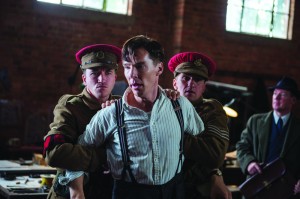The Imitation Game
The Imitation Game, 2014, 4 ½ stars
A worthy tribute
Alan Turing finally gets cinematic respect
From The Orlando Weekly, December 24, 2014
Adolf Hitler hated homosexuals almost as much as he hated Jews, sending tens of thousands to prison or concentration camps. It’s ironic justice, therefore, that a gay man (mathematician Alan Turing) – more than any other person except the “big three” leaders of World War 2 – brought about his demise, by cracking the Nazi’s Enigma code.
The Imitation Game, directed by Norwegian Morten Tyldum, tells Turing’s tale of both triumph and tragedy with flair, passion and a clever, almost meta-theatrical, framing device. It does employ dashes of heavy-handedness and historical revisionism, but only to tidy up the storytelling, not to magnify or distort Turing’s accomplishments, which need no embellishment. And for those who aren’t entirely familiar with either Turing’s life or the moral dilemma the Allies faced once they had solved Enigma, the film delivers some fascinating surprises.
As Turing, Benedict Cumberbatch is thoroughly engaging. His performance may not have the immediate allure of fellow Brit Eddie Redmayne’s recent turn as Stephen Hawking in The Theory of Everything, but this is a better film. I gave that movie high marks too, but The Imitation Game is sharper, smarter and more impactful, almost rising to the level of a five. Expect an Oscar nomination for Cumberbatch. (I can hear the Cumberbitches swooning now.)
Speaking of swooning, allow this reviewer to fawn again over Keira Knightley, who, perhaps more than any other current actress except Jessica Chastain, has got part-picking down to a science. From Atonement to Anna Karenina to her latest offering, which features her as Joan Clarke, Turing’s friend and fellow code cracker, she’s proved her brilliance.
Even more importantly, Cumberbatch and Knightly have chemistry. Though Graham Moore’s screenplay – from a book by Andrew Hodges – slightly exaggerates their closeness, it never feels forced. And when Turing turns to Joan and proclaims with striking stoicism, “We’re going to break an unbreakable Nazi code and win the war,” you absolutely believe they’ll do it.
Downton Abbey fans will recognize Allen Leech – Tom Branson in that TV series – as one of Turing’s colleagues, but he’s just one in the array of competent supporting performers, including a memorable Mark Strong as Turing’s MI6 boss and a superb Alex Lawther as young Turing. And all the actors blend well with the stellar cinematography and production design, which set the right mood while also masking the fact that the story is slightly rushed.
The movie draws its name from a Turing research paper that discussed how to tell the difference between a man and a computer, the latter able to merely imitate human characteristics. Although that title serves as an interesting comment on Turing’s need to disguise his homosexuality, a better one might have been “The Originality Game,” as there’s never been another man quite like Turing, who practically invented the modern computer. And though Codebreaker, a 2011 TV movie, tackled the same subject, The Imitation Game has finally given Turing’s remarkable legacy the broad cinematic respect it merits by showcasing it proudly in one of the five best films of the year.
© 2014 Orlando Weekly / MeierMovies, LLC
